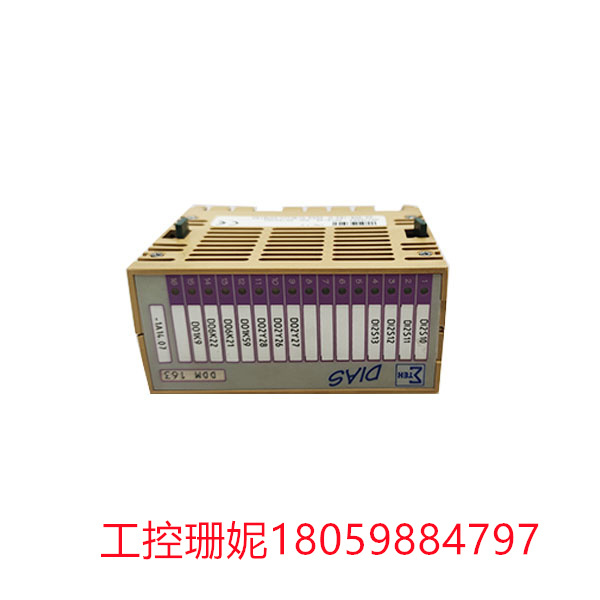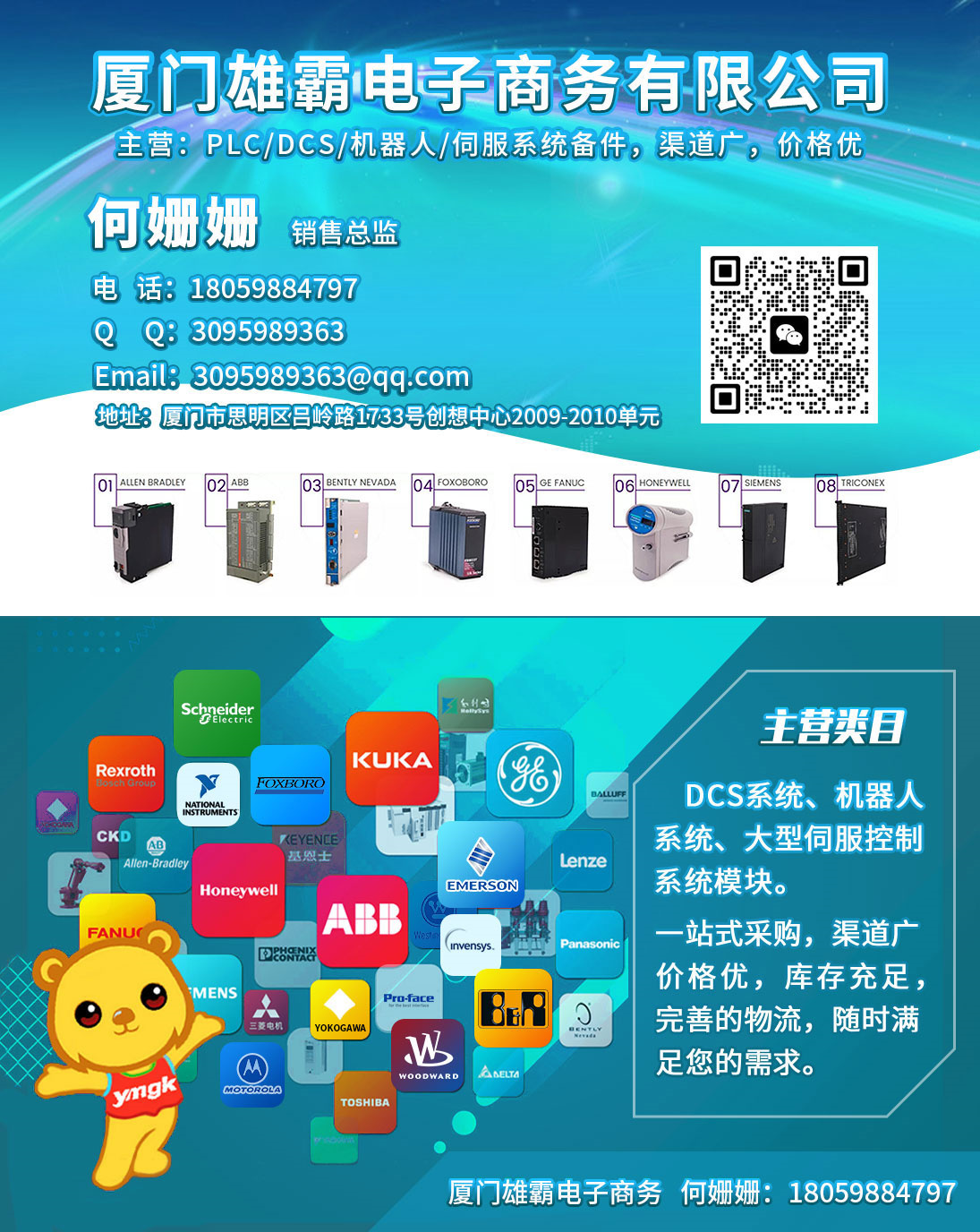
型号: DDM163
制造商已停产
采样率:最高1MSPS分辨率:16位
通信接口:RS232、RS485、以太网
电源电压:24V DC
工作温度:-408℃~+85℃
DDM 163模块有8个数字输出+ 24 V/ 2A(正开关), 这些输出是防止短路的。 此外,DDM 163 DIAS模块具有8个数字输入,+24 V电平用于信号状态的读取。 0 "和。 1"。 为了抑制信号电路中发生的小故障,可以使用适当的输入滤波器。
在输出标签的一侧,黄色led(输出)和绿色led(输入)表示信号状态。
技术数据
数字输出
输出数量:8
短路保护:是的
最大允许连续:2负载电流/通道
最大总电流(全部8
6A(100%工作时间)
输出(电感负载):最大1.95焦耳/ 4通道
电源两端压降:≤1v
(输出接通)
输出剩余电流:< 12ua
(关闭)
接通延时:<200 us
关断延时:< 200 us
状态显示:黄色led
DIAS DDM163模块
模块又称构件是能够单独命名并独立地完成一定功能的程序语句的集合(即程序代码和数据结构的集合体)。 它具有两个基本的特征:外部特征和内部特征。 外部特征是指模块跟外部环境联系的接口(即其他模块或程序调用该模块的方式,包括有输入输出参数、引用的全局变量)和模块的功能;内部特征是指模块的内部环境具有的特点(即该模块的局部数据和程序代码)。
模块有各种类型,如单元操作模块(换热器、精馏塔、压缩机等)、计算方法模块〈加速收敛算法、化算法等)、物理化学性质模块(汽液相平衡计算、热烩计算等)等。
DIAS DDM163功能模块独立的概念是功能模块化、抽象、信息隐蔽和局部化概念的直接结果。
抽象是指对事物、状态或过程之间所存在的某些相似的方面集中和概括起来,而暂时忽略他们之间的差异,即考虑抽象事物的本质特征而暂时不考虑他们敞细节。 信息隐蔽是指再设计功能模块时使得一个功能模块内所包含的信息(过程或数据),对于不需要这些信息的功能模块来说是不能访问的。 信息隐蔽原则对于以后在软件维护期间修改软件时会带来*的好处,因为大星数据和过程是软件的其他部分所不能觉察的,因而再对某个功能模块修改时就不大会影响到软件的其他部分,所谓局部化是指把一些关系密切的软件元素在物理位置上彼此靠近。
DIAS DDM163功能模块独立性是通过制定具有单一功能并且和其他功能模块没有过多联系的功能模块来实现的。 每个功能模块只涉及该软件要求的一个具体子功能,而且与软件结构的其他部分的接口是简单的。
功能模块独立性好的软件接口简单,易于编制,独立的功能模块也比较容易测试和维护,限制了功能模块之间由于紧密而引起的修改副作用。 独立性是保证软件质量的重要因素。

Model: DDM163
The manufacturer has discontinued production
Sampling rate: up to 1MSPS Resolution :16 bits
Communication interface :RS232, RS485, Ethernet
Power supply voltage :24V DC
Operating temperature :-408℃~+85℃
The DDM 163 module has 8 digital outputs + 24 V/ 2A(positive switch), which are short-circuitproof. In addition, the DDM 163 DIAS module has 8 digital inputs and a +24 V level for the reading of signal status. 0 "and. 1". In order to suppress small faults occurring in the signal circuit, an appropriate input filter can be used.
On one side of the output label, a yellow led(output) and a green led(input) indicate the signal status.
Technical data
Digital output
Output quantity :8
Short-circuit protection: Yes
Maximum allowable continuous :2 load current/channel
Maximum total current (all 8
6A(100% working hours)
Output (inductive load): Max. 1.95 joules / 4 channels
Voltage drop at both ends of the power supply :≤1v
(output connected)
Output residual current :< 12ua
(Closed)
Connection delay :<200 us
Turn-off delay :< 200 us
Status display: Yellow led
DIAS DDM163 module
A module, also known as a component, is a collection of program statements that can be individually named and independently complete a certain function (that is, a collection of program code and data structures). It has two basic characteristics: external characteristics and internal characteristics. External features refer to the interface between the module and the external environment (that is, the way other modules or programs call the module, including input and output parameters, referenced global variables) and the function of the module; Internal characteristics refer to the characteristics of the internal environment of the module (i.e. the local data and program code of the module).
There are various types of modules, such as unit operation modules (heat exchangers, rectification towers, compressors, etc.), calculation method modules (accelerated convergence algorithm, chemical algorithm, etc.), physical and chemical properties modules (vapo-liquid phase equilibrium calculation, hot cooking calculation, etc.).
The concept of functional module independence in DIAS DDM163 is a direct result of the concepts of functional modularity, abstraction, information concealment and localization.
Abstract refers to the concentration and generalization of some similar aspects existing between things, states or processes, while temporarily ignoring the differences between them, that is, to consider the essential characteristics of abstract things without temporarily considering their open details. Information concealment refers to the redesign of a functional module so that the information (process or data) contained in a functional module is inaccessible to functional modules that do not need this information. The principle of information concealment will bring the greatest benefits when modifying software during software maintenance in the future, because the data and process are not perceptible to other parts of the software, so the modification of a functional module will not affect other parts of the software. The so-called localization refers to the physical proximity of some closely related software elements to each other.
DIAS DDM163 functional module independence is achieved by developing functional modules that have a single function and do not have too much connection with other functional modules. Each functional module involves only one specific sub-function required by the software, and the interface with the rest of the software structure is simple.
Functional module independence Good software interface is simple, easy to compile, independent functional modules are also relatively easy to test and maintain, limiting the modification side effects caused by tight between functional modules. Independence is an important factor to ensure software quality.

| ICS TRIPLEX | T8111C | TERASAKI | ERC-244 |
| ICS TRIPLEX | T8850 | ABB | HIEE200038R0001 |
| FOXBORO | FCP270 P0917YZ | FOXBORO | FBM214B P0927AH |
| ABB | PM866 3BSE050200R1 | HONEYWELL | 05701-A-0302 |
| ABB | 07DC92D GJR5252200R0101 | WOODWARD | 9907-1290 |
| ABB | LDGRB-01 3BSE013177R1 | DANFOSE | EKC 361 |
| GE | DS200VPBLG1A | ABB | MB510 3BSE002540R1 |
| GE | DS200DDTBG1A | ABB | DAPI100 3AST000929R109 |
| GE | DS200FCGDH1 B | ABB | CI522A 3BSE018283R1 |
| YOKOGAWA | SAI143-H53 | SCANLAB | INTELLISCANDE III14-532NM SCANLAB |
| SEM | MT30R4-37 | BENTLY | 3500/22M 138607-02 |
Copyright © 2022-2024 厦门雄霸电子商务有限公司 版权所有 备案号:闽ICP备14012685号-33